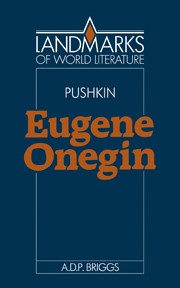Book contents
- Frontmatter
- Contents
- Preface
- Note on translations and references
- Chronology
- Chapter 1 The poetry of Eugene Onegin
- Chapter 2 Shades of unreality
- Chapter 3 The unreal reputations of Eugene Onegin and Tatyana Larina
- Chapter 4 Olga, Lensky and the duel
- Chapter 5 It is in verse, but is it a novel?
- Guide to English translations and further reading
Chapter 3 - The unreal reputations of Eugene Onegin and Tatyana Larina
Published online by Cambridge University Press: 05 November 2011
- Frontmatter
- Contents
- Preface
- Note on translations and references
- Chronology
- Chapter 1 The poetry of Eugene Onegin
- Chapter 2 Shades of unreality
- Chapter 3 The unreal reputations of Eugene Onegin and Tatyana Larina
- Chapter 4 Olga, Lensky and the duel
- Chapter 5 It is in verse, but is it a novel?
- Guide to English translations and further reading
Summary
Eugene Onegin
Eugene Onegin is generally seen as a complex and rather mysterious figure; he is often described as an enigma. The explanations of his character are as varied as they are numerous. However, they do have one thing in common: a tendency to absolve Onegin from complete blame for his actions. Perhaps the mushrooming of explanations and the a priori willingness to mitigate Onegin's guilt are connected. Most critics start from the premise that there must be more to Onegin's awfulness than bad character alone. If we were to regard him at the outset as a mature man to be held fully responsible for all that he says and does, this simpler approach might cut through some of the complexities. This is what we shall now try to do.
Guilty or not guilty?
First, the question of his culpability and its mitigation. What is he guilty of, and what do people say about his blameworthiness? He is to be arraigned for selfishness and antisocial behaviour of such an extreme kind that they do not balk at cruelty or even murder. Not content with insulting and humiliating most of the people he encountered, for no good reason beyond entertainment, Onegin eventually went so far as to shoot dead, wilfully and under avoidable circumstances, a naive youth who stood on the brink of marriage to an attractive young country girl. The reasons which lie behind this vicious act, although not immediately obvious, are comprehensible and consistent.
- Type
- Chapter
- Information
- Alexander Pushkin: Eugene Onegin , pp. 48 - 79Publisher: Cambridge University PressPrint publication year: 1992

